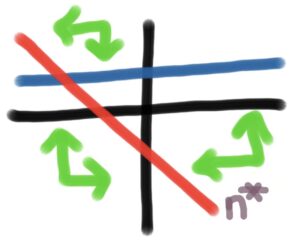How I Learned to Love Macro
Nancy Folbre
30 January 2019Economies cannot be reduced to the production of commodities by means of commodities. They should be understood, more broadly, as the production of people by means of people.
I have despised macroeconomics–even relatively innovative, post-Keynesian, gender-infused versions—for many years, for two big reasons. First, macro remains largely focused on an output variable, Gross Domestic Product, that systematically mismeasures the total value of material goods and services produced, Second, it treats the quantity of one of its most important inputs, labor, as exogenously given and/or relatively unimportant.

This is so wrong. Economies cannot be reduced to the production of commodities by means of commodities. They should be understood, more broadly, as the production of people by means of people. My collaborator James Heintz develops this critique in exceptionally clear and accessible terms in his new book The Economy’s Other Half. All of the participants in the Gender and Macro project under the rubric of the Care Work and The Economy project are, in one way or another, subverting the conventional paradigm.
They have actually taught me to love macroeconomics by showing how analytical models can enrich narrative accounts of social reproduction. I got so inspired that I actually sat in on a graduate course (taught by none other than James Heintz) and reviewed my calculus.
I went back and read some classic articles by Paul Samuelson and others explaining why intergenerational transfers (including the support and care of children and the elderly) cannot be organized by voluntary exchange.
James and I outlined some of the ways economists have conceptualized expenditures on children in a joint paper published in the Basque journal Ekonomiaz (also available on the Political Economy Research Institute website). Most recently, he took the lead on another joint paper that explains long-run macro models minimize the importance of demographic change (“Endogenous Growth, Population Dynamics, and Returns to Scale: Long-Run Macroeconomics When Demography Matters”).
It seems pretty obvious that models treating population growth as exogenous ignore the most important link between the family economy and the market economy. It is far less obvious that assumptions regarding constant returns to scale in production functions can have similar implications. Our paper explains why this is the case. It also develops an endogenous growth model that highlights the potentially negative macroeconomic effects of population growth rates that are either “too low” or “too high.” Microeconomic decisions don’t always magically lead to good macroeconomic outcomes.
The below-replacement fertility rates now common to many countries, including the U.S., Italy, Spain, Korea, and China, can potentially have negative macroeconomic implications, as can the high fertility rates characteristic of many sub-Saharan countries. In a sequel to this paper, we plan to develop its microeconomic foundations more fully, demonstrating the macroeconomic effects of public policies such as parental allowances and paid family leaves as well as changes in women’s bargaining power in the home. This model could also bring immigration policies into the macroeconomic limelight.
Who knew that macro could be so much fun?
Hendrik Van den Berg
Excellent points. I will take this into account when I plan my intermediate macro (ECON 204) course for next fall. These are the type of “real micrcofoundations” we need to include in a Post Keynesian macro course.
With regard to population growth, there are clearly supply side and demand side issues involved. Above all, let’s not forget the effect of population growth on the natural environment. Humanity’s environmental footprint is equal to the average individual impact times the total number of people on Earth, which suggests a population decline would be a very good thing for the planet. How do the population effects all work out if we include the environmental constraints on growth in our macroeconomic analysis along with the obvious growth effects outlined in this note? Surely this strengthens the conclusion that things will not work themselves out under voluntary exchange.
Yes, macro is fascinating if we will only widen our perspectives to include the real world.
Mac-Kemp
When former President, Obama said recently “They are not even asking the right questions” a perfect jab at the current president, Donald Trump. Obama comments summarizes how easy it is to criticize or verbally destroy than to build. I think any other person, Republican or Democrat will serve this country better than Mr. Trump have thus far. Let us be fair in our assessment performances of public officials. Mr. Trump is there for name & fame only.